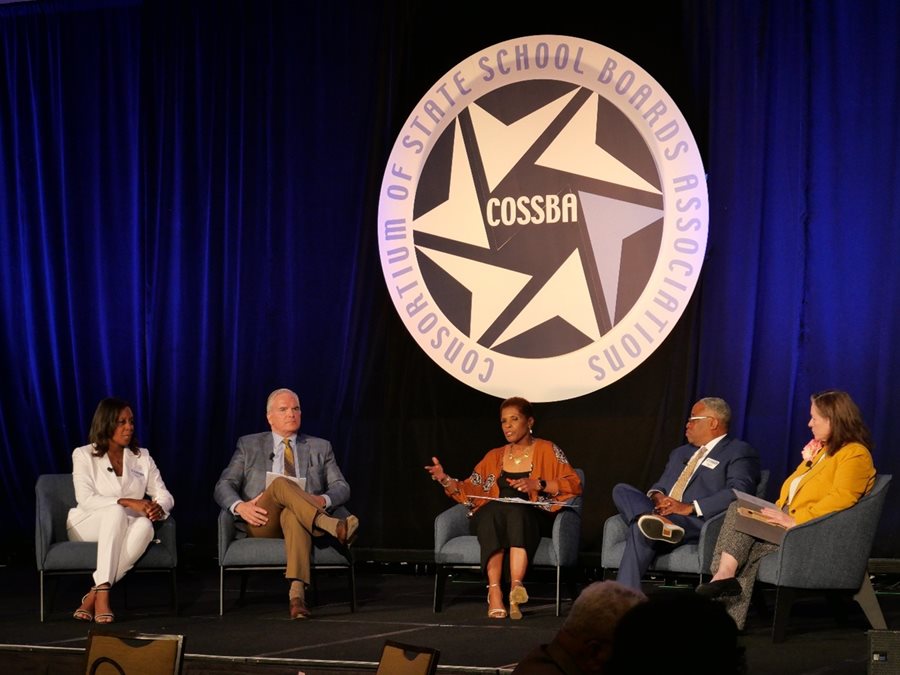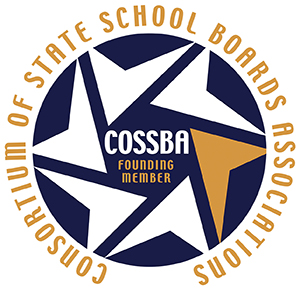COSSBA Devotes First Day of Conference to Urban Boards Alliance
-
Date PostedApril 4, 2023
-
CategoryCOSSBA
Challenging educational environments and issues exist in all school districts across the country, however, they can vary in size, scope, and complexity. The Consortium of State School Boards Association (COSSBA) dedicated the first day of its Inaugural Conference to its Urban Boards Alliance to support members with knowledge and resources to address challenging environments.
Urban Boards Alliance (UBA) Day offered keynote speakers and learning sessions on topics of mental health, poverty, equity, student achievement barriers, and school violence.
Kicking off UBA Day was opening session speaker Donna Beegle, on why poverty-informed, committed education leaders are needed more than ever to break barriers. Beegle has dedicated her life to helping people understand the devastating effects of poverty, sharing examples from her own lived experience born into deep generational poverty.
Leading volunteers through an activity on perception, Beegle demonstrated that “perception is so powerful it can make you see things that aren’t there; it can make you miss things that are there.”
She shared insights into communication norms and responses not understood by students in poverty. She emphasized the importance of developing a skillset for communicating more effectively with students and families in poverty.
Beegle asked attendees to consider, “How do we create an environment that is inclusive and responsive if we do not understand poverty?” School board members, as education leaders, can set the tone for values and perception by gaining awareness and understanding of poverty and its history and causes.

UBA advisors and state association executives: Michelle McKissack (Memphis-Shelby County School District, Tennessee), Tom Bertrand (IASB), Valarie Wilson (Georgia School Boards Association), Rodney Jordan (Norfolk City Public Schools, Virginia), Andrea Messina (Florida School Boards Association)
A luncheon panel of UBA advisory committee members and state association executives discussed the Alliance as essential to the forming of COSSBA as a new organization. Recognizing that challenging environments and issues are not unique to only urban school districts, UBA is inclusive of all school boards, including rural and suburban. UBA resources are offered to COSSBA members at no additional cost.
IASB Executive Director Tom Bertrand also addressed what’s next for COSSBA, including staff support to serve members. He noted COSSBA’s role “building capacity of state associations to effectively serve members, which in turn leads to excellence in school board governance and improved student outcomes.” Bertrand will become executive director of COSSBA on July 1.
To close out UBA day, educator and school board member Steve Gallon III brought attendees to their feet and reenergized school board members to go beyond intentional leadership and make it better.
Gallon has over 30 years of educational service as an educator, principal, superintendent, and board member. He is the vice-chair and elected District 1 school board member for the Miami-Dade County Schools in Miami-Dade County, Florida, the nation’s fourth-largest school district.
“Titles alone don’t guarantee success or garner one’s respect,” Gallon stressed. “We are guaranteed success through our day-to-day actions and hard work.”
As a board member, beyond campaign and victory, there is the real work of leadership. Gallon pointed to the oath of office as a reminder of what servant leadership must render.
“The oath should not be reduced to words and limited to the moment. It is a commitment to the future and a reflection of what you plan to do,” he explained.
Gallon described his commitment to meaningful and measurable outcomes, so his legacy shows that he acted to make things better in his district.
“School board members are draped in courage and compassion,” he added. “The oath and related actions demand that they stand against inequities and disparities in academic achievement.”
